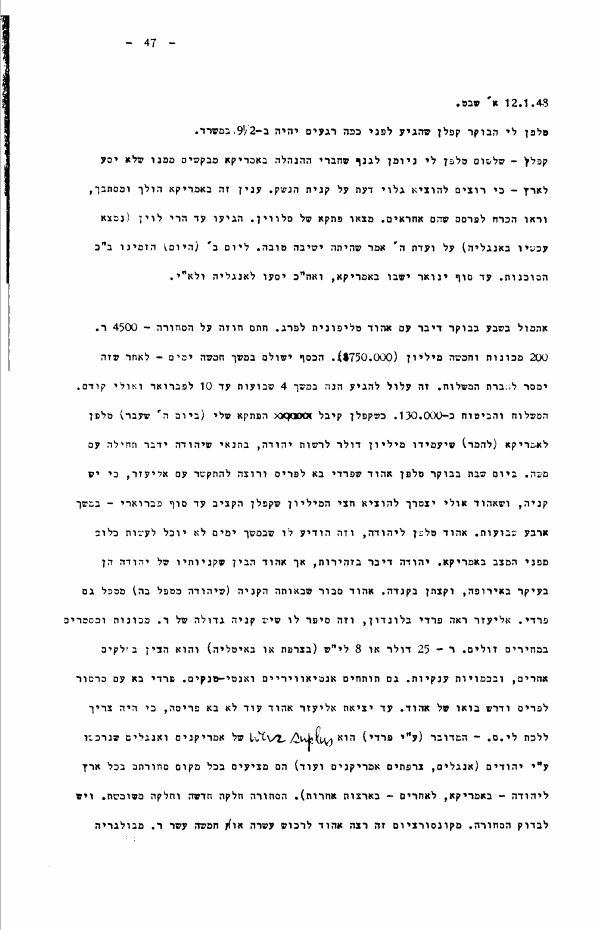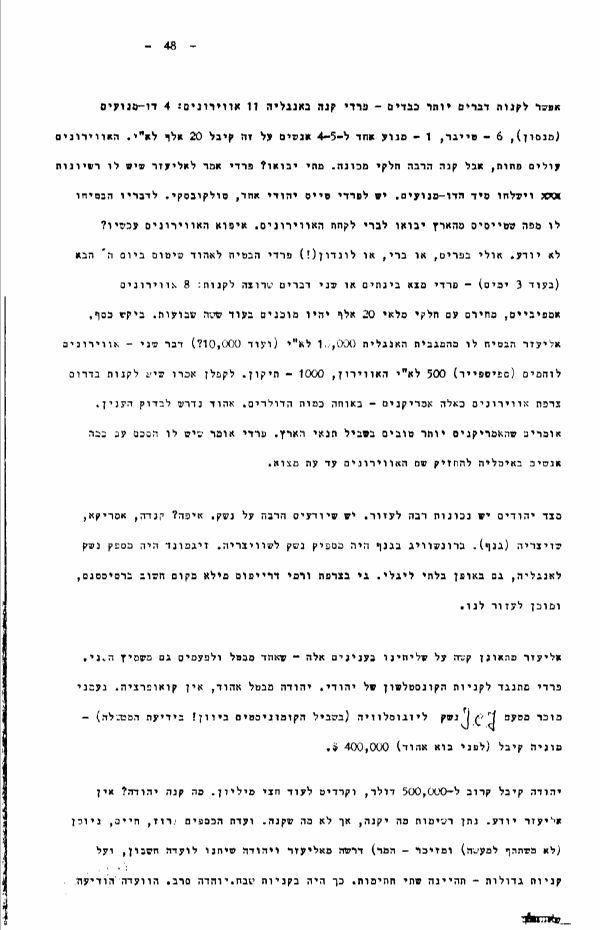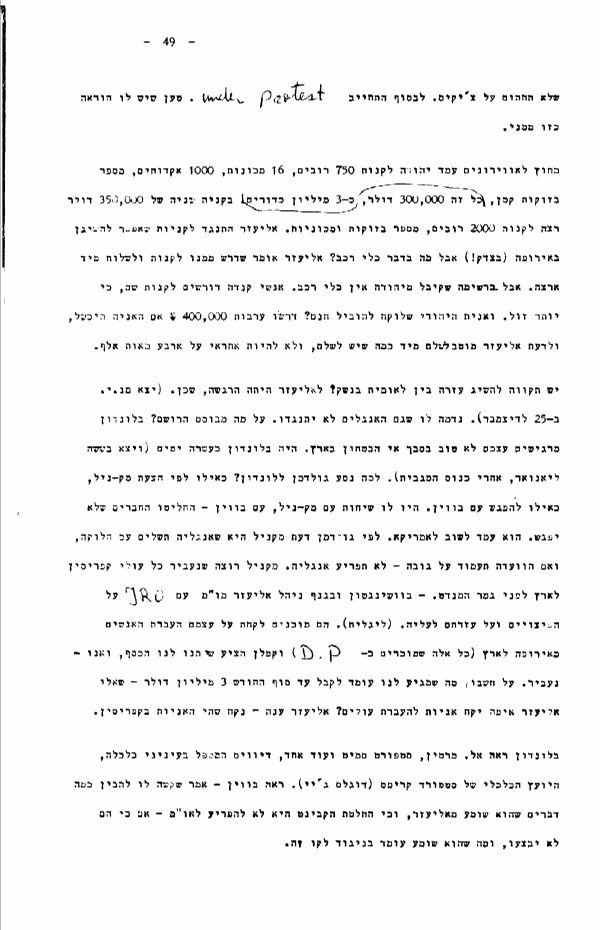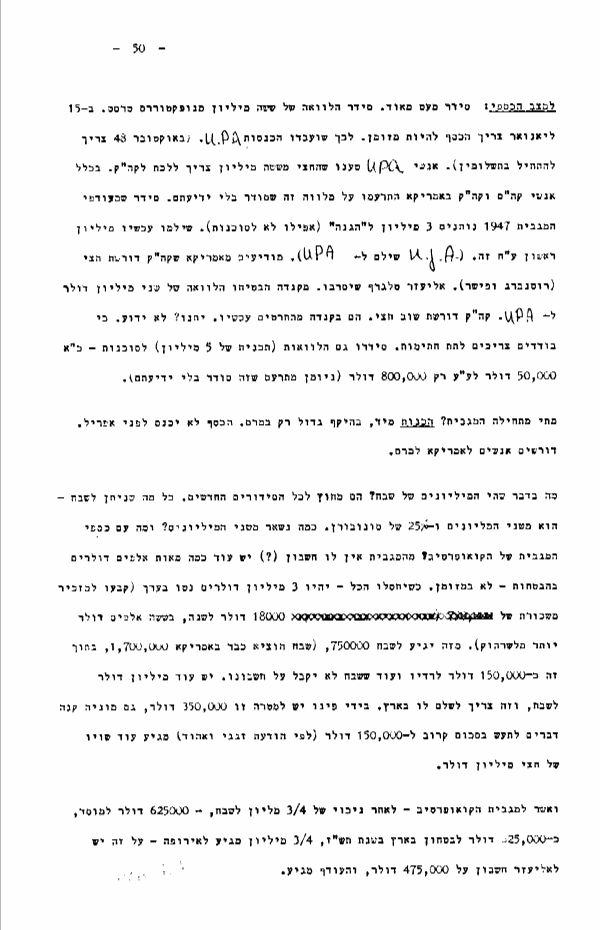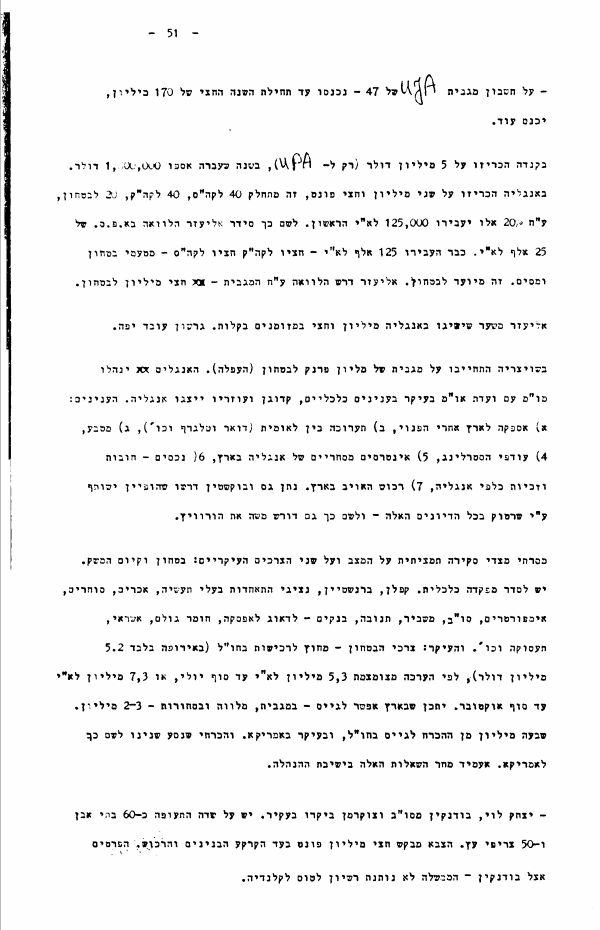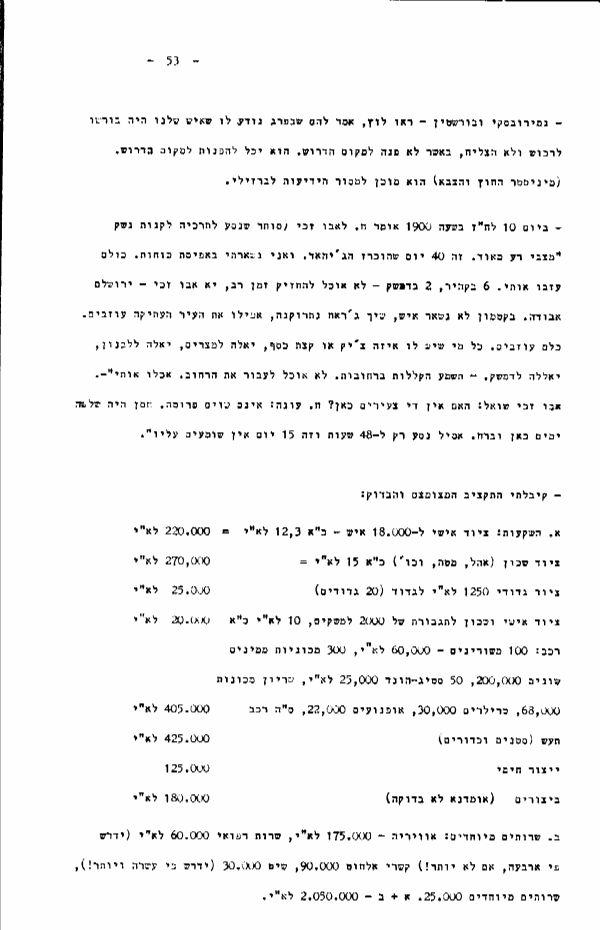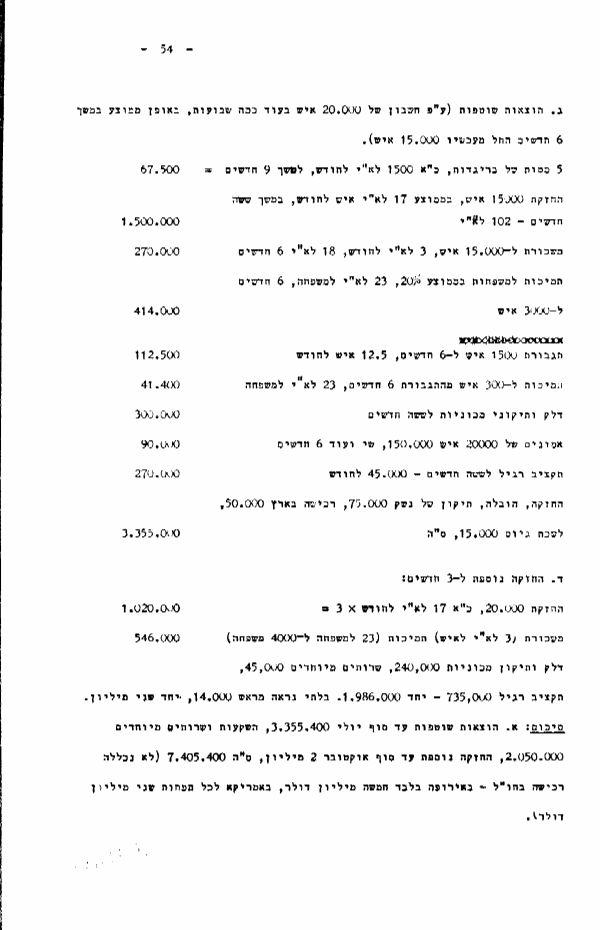1
of
Places:
Geneve
England
New Jersey
Prague
Paris
Canada
Bulgaria
Yugoslavia
London
France
Dan
Switzerland
New York
Washington
Ein Gev
Kiryat Haim
Dead Sea
Bareket
Turkey
Damascus
Cairo
Jerusalem
Egypt
The use of the photograph is subject to the Copyright Law, 2007
12.01.1948
224820
[Monday,] January 12, 1948 [Eliezer] Kaplan telephoned me yesterday [to say] that he’d arrived a few minutes earlier; he’ll be in the office at 9:30. Kaplan: Yesterday [Emanuel] Neumann telephoned him in Geneva [to say] that the [Zionist Organization of America] Executive members in America are asking him not to travel to the country – they want to issue a public statement about the weapons procurement [in light of the discovery of the shipment in New Jersey]. The issue is becoming more complicated in America, and they deemed it necessary to announce publicly that they [the Agency Executive] are responsible. The investigators found a note from Slavin. They got as far as [arms procurement intermediary] Harry Levine [sp.] (in England now). Regarding the Committee of Heh [Five] [the UN Palestine Commission], he said there was a good meeting. They invited a [Jewish] Agency representative for Monday (today). They’ll be based in America until the end of January, then they’ll travel to England and to Eretz Israel. Yesterday at 7 a.m. he spoke by telephone with Ehud in Prague. [Ehud] signed a contract for the merchandise – 4,500 R. [rifles], 200 [heavy] machine [gun]s, and 5 million [bullets] ($ 750,000). The money will be paid over the course of five days – after it [the merchandise] is delivered to the shipping company. It’s expected to arrive here over the course of four weeks, by February 10 and possibly earlier. The shipment and insurance are about 130,000. When Kaplan received my note (last Thursday) he telephoned (Hammer) [Finance Committee] to have them make $1 million available to Yehuda [Arazi], on the condition that first Yehuda speak with Moshe [Sharett]. On Saturday morning Ehud telephoned [to say] that Freddy [Fredkins] is coming to Paris, and wants to talk with Eliezer [Kaplan] because there’s a purchase to be made, and Ehud might need to expend the half million that Kaplan budgeted through the end of February – over the course of four weeks. Ehud telephoned Yehuda [Arazi], who informed him that he wouldn’t be able to do anything for several days because of the situation in America [following the discovery in New Jersey]. Yehuda spoke cautiously, but Ehud understood that Yehuda’s purchases are primarily in Europe, and a few in Canada. Ehud believes that the same procurement (that Yehuda is handling) is also being handled by Freddy. Eliezer saw Freddy in London, and he [Freddy] told him that there’s a big purchase to be made of R. [rifles], [heavy] machine [gun]s, and nails [bullets] at cheap prices. R. – $ 25 or £ 8 sterling (in France or Italy), and the same holds for other parts, and in huge quantities. Also anti-aircraft and anti-tank cannons. Freddy came to Paris with a broker and demanded that Ehud come. By the time of Eliezer’s departure, Ehud had not yet arrived in Paris because he had to go to Yugoslavia. The matter under consideration (by Freddy) is American and English war surplus that was purchased by Jews (English, French, Americans, and others). They’re offering their merchandise in every country (to Yehuda [Arazi] – in America, to others – in other countries). Some of the merchandise is new and some is used, and it has to be examined. Out of this consortium Ehud wanted to purchase 10 or 15 [thousand] rifles. Heavier items can be bought from Bulgaria. Freddy bought 11 airplanes in England: 4 twin-engine (Anson), 6 – Tiger, single-engine, for 4-5 men. For this he got P£ 20,000. The airplanes cost less, but he brought many machine [spare] parts. When will they arrive? – Freddy told Eliezer that he has permits. The twin-engines will be sent right away. Freddy has one Jewish pilot, [Dan] Tolkowsky. According to him he received promises from here that pilots would come from the country to Bari to take the airplanes. Where are the airplanes now? – He doesn’t know. Maybe in Paris, or Bari, or London (!). Freddy promised Ehud that he would fly out next Thursday (in 3 days). In the meantime Freddy found two more things that he wants to buy: 8 amphibian airplanes. Their price with reserve parts is 20,000. They’ll be ready in six weeks. He requested money. Eliezer promised him P£ 10,000 from the English fundraising campaign ([Ben-Gurion:] and another 10,000?). Secondly – fighter planes (Spitfire) P£ 500 per plane, P£ 1,000 – repair. Kaplan was told that in southern France there are American airplanes of this sort [that is, fighter planes] for the same amount of dollars. Ehud was tasked with looking into the matter. They say that the American [planes] are better suited to conditions in the country. Freddy said that he has an agreement with a few people in Italy to hold the planes there until the time is right [i.e., until the British withdrawal]. Among Jews there’s a great deal of willingness to help. There are some who know a lot about weapons. Where? – In Canada, America, Switzerland. Bronschweig [sp.] in Geneva used to supply arms to Switzerland. Sigmund used to supply arms to England, including illegally. Guy [Mollet?] in France and Remi Dreyfus, had an important role in the [French] Resistance and is willing to help us. Eliezer complains bitterly about our delegates in these matters – that one dismisses, and sometimes also badmouths, the other. Freddy objects to Yehuda’s Constellation purchases. Yehuda dismisses Ehud. There’s no cooperation. Na’amani sells weapons to Yugoslavia on behalf of the I.C.I. [Imperial Chemical Industries of Britain] (for the communists in Greece! with government knowledge). Munya [Mardor] received $ 400,000 (before Ehud’s arrival). Yehuda received close to $ 500,000, and credit for another half million. What did Ehud buy? Eliezer doesn’t know. He presented lists of what he would buy, but not of what he bought. The Finance Committee – Rose Halprin, Hayim Greenberg, [Emanuel] Neumann (not actually participating), and the secretary, Hammer – demanded that Eliezer and Yehuda give the committee a financial statement, and for large purchases – that there be two signatures. This is how it was with Shevah [Slavin]’s purchases. Yehuda refused. The committee announced that it would not sign checks. Finally he agreed under protest. Claimed that he had such an instruction from me. Aside from airplanes Yehuda was going to buy 750 rifles, 16 [heavy] machine [gun]s, 1,000 pistols, a small number of bazookas, about 3 million bullets: all this $ 300,000. In a second purchase of $ 350,000 he wanted to buy 2,000 rifles, a number of bazookas, and vehicles. Eliezer objected to purchases that could be obtained in Europe (rightly so!). But what about vehicles? Eliezer says that he demanded that he buy and send [them] immediately to the country. But in the list that he received from Yehuda there are no vehicles. The people in Canada are demanding that the purchases be made there, because it’s cheaper. [And what about] the ship of the Jew who takes [who promised] to deliver for free? They demanded a guarantee of $ 400,000 if the ship fails, and in Eliezer’s opinion it’s better to immediately pay what needs to be paid, and not to be accountable for 400,000. Is there hope of obtaining international assistance in weapons? – Eliezer had the impression that there is. (He left New York on December 25). It seems to him that the English won’t object either. What is this impression based on? – In London they don’t feel good about muddle of insecurity in the country. He was in London for about ten days (left on January 6, after the fundraising meeting). Why did [Nahum] Goldmann travel to London? – Seemingly at McNeil’s suggestion – seemingly to meet with Bevin. He had talks with McNeil. The associates decided that he should not meet with Bevin. He was about to return to America. According to Goldmann, McNeil is of the opinion that England will come to terms with partition, and if the [UN Palestine] Commission does well, England won’t interfere. McNeil wants us to transfer all the Cyprus immigrants to the country before the Mandate ends. In Washington and in Geneva Eliezer conducted negotiations with the I.R.O. [International Refugee Organization – which oversaw the return of displaced persons] regarding reparations and their assistance in (legal) ‘aliya. They’re prepared to take on the responsibility of transporting people from Europe to the country (all those recognized as D.P. [displaced persons]). Kaplan suggested that they give us the money – and we’ll transport [them]. Out of the amount due us, he’ll receive $ 3 million by the end of the month. They asked Eliezer: Where will he get ships to transport immigrants? Eliezer replied: We’ll take the two ships [the Pans] in Cyprus. In London Eliezer saw [Assistant Under-Secretary of State at the Colonial Office John] Martin, Stafford [should be: Trafford], Smith [an assistant secretary in the Colonial Office], and another one, Davies [sp.], who handles economic affairs, and [Chancellor of the Exchequer] Stafford Cripps’s economic advisor (Douglas Jay). [Head of the Independent Labour Party and Minister of Health Aneurin] Bevan said he’s having trouble understanding a few things he heard from Eliezer, and that the Cabinet’s decision is not to interfere with the UN – although they [the English] will not implement [the UN resolution]. What he’s hearing contradicts this line. Re: the financial situation: Very little has been arranged. He arranged a loan of six million from Manufacturers Trust. On January 15 the money should be [available] in cash. UPA [United Palestine Appeal] revenues were collateralized for this (in October 48 payments are due to begin). The UPA personnel claimed that half of the six million should go to KKL [Keren Kayement LeIsrael – Jewish National Fund]. Keren HaYesod and KKL personnel in America were angry about this loan, which was arranged without their knowledge. It was arranged that out of the surplus from the 1947 fundraising campaign, 3 million would be given to the Haganah (not even to the Agency). Now they paid the first million against this amount. (UJA [United Jewish Appeal] paid the UPA). [Morris] Rothenberg and [Max] Fisher report from America that the KKL is demanding half. Eliezer telegraphed to [tell them to] refuse. From Canada there was a promise of a loan of $ 2 million to the UPA. KKL is demanding half again. In Canada they’re now regretting [the promise]. Will they give it? – Don’t know. Because a few individuals need to sign as guarantors for these signatures. They also arranged loans (a plan of 5 million) for the Agency – each $ 50,000 [for now?] only $ 800,000 ([Emanuel] Neumann is angry that this was arranged without his knowledge). When does the fundraising campaign begin? Preparations immediately, on a large scale only in March. The money won’t come in before April. Need people for America in March. What about the two million [for] Shevah [Slavin, who handled procurement in the US]? That’s outside of all the new arrangements. Everything that was given to Shevah – is from the two million and [Rudolf] Sonneborn’s 25%. What’s left of the two million? And what about the money from the cooperative’s fundraising campaign? From the fundraising campaign he doesn’t have an accounting (?). There are a few more hundreds of thousands of dollars in pledges – not in cash. When everything is eliminated [deducted] – there will be approximately $ 3 million net (they set an annual salary of $ 18,000 for the secretary, about $6,000 more than for Shertok). Of this Shevah is due to receive 750,000 (Shevah has already spent 1,700,000 in America, of this $ 150,000 for radio and more that Shevah won’t receive against his account[)]. There’s another million dollars for Shevah, and this needs to be paid to him in the country. Towards this end Pino [Pinchas Ginzburg] has $ 350,000 for him; Munya also bought things for Ta’as in an amount close to $ 150,000 (according to a message from Zagagai and Ehud). [He’s] due another half million dollars’ worth. As to the cooperative’s fundraising campaign [for defense and procurement purposes] – after a deduction of ¾ million for Shevah, – $ 625,000 for the Mossad [le-‘Aliya Bet], about $ 625,000 for in-country defense in the year 5,707 [September 1946 – September 1947], ¾ million goes to Europe – against this Eliezer has $ 475,000 due, and the remainder is coming [will be available]. – In terms of the UJA balance for 47 – by the start of the year half of the 170 million has come in, more will come in. In Canada they announced $ 5 million (only for UPA), lost year they collected $ 1,800,000. In England they announced 2 ½ million pounds, this is divided into 40 for KHS [Keren HaYesod?], 40 for KKL, 20 for defense, against this 20% they’ll transfer the first P£ 125,000. Towards this end Eliezer arranged a loan of P£ 25,000 with APC [?] [Anglo-Palestine Company, predecessor of Bank Leumi]. They’ve already transferred P£ 125,000 – half to KKL [and] half to KHS [Keren HaYesod?] – for reasons of defense and taxes. It’s intended for defense. Eliezer requested a loan against the fundraising campaign – half a million for defense. Eliezer thinks they’ll easily get one and a half million in cash in England. Gershon [Hirsch-Avner] is doing good work. In Switzerland they committed to a fundraising campaign of a million francs for defense (and clandestine immigration). – The English will conduct negotiations with the UN [Palestine] Commission primarily on economic issues. Cadogan and his assistants will represent England. The issues: 1) supplies to the country after their withdrawal, 2) international communication (post, telegraph, etc.), 3) currency, 4) sterling surpluses, 5) England’s trade interests in the country, 6) assets – debts and entitlements vis-à-vis England, 7) enemy [Italian and German] property in the country. [Robert] Nathan, [Oscar] Gass, and [Moshe] Bukstein [sp.] insisted that Shertok include [APC director Eliezer] Hoofien in all these talks – and to this end Moshe also insists on [David] Horowitz. I presented a concise review of the situation and of the two main needs: defense and maintenance of the economy. Need to arrange an economic headquarters: Kaplan, [Peretz] Bernstein, a representative of the Manufacturers’ Association, farmers, merchants, importers, Solel Boneh, Mashbir, Tnuva, banks – to ensure supplies, raw material, credit, employment, etc. And the essence: defense needs. Aside from purchases abroad (in Europe alone $ 5.2 million – and according to a conservative estimate P£ 5.3 through the end of July, or P£ 7.3 through the end of October). Possibly we could raise 2-3 million in the country – through a fundraising campaign, loan, and commodities. Seven million will have to be raised abroad, and primarily in America. And two of us will have to go to America for this. Tomorrow I’ll present these questions at the Executive meeting. – Yitzhak Levi, [Eliezer] Bodankin of Solel Boneh, and [Yoav] Zuckerman visited ‘Akir [Tel Nof]. There are about 60 stone houses and 50 wooden shacks at the airport. The army is asking for half a million pounds [P£] for the land, the buildings, and the property. Bodankin has the details. The government is not granting a permit to fly to Kalandiya [‘Atarot’s airfield]. – Arthur [Luba Eliav’s codename] proposes appointing someone specifically to handle recruits from Mizrahi [Eastern] communities]. [We’ll] need printed material for recruits. I asked him to give me a budget for his trip, his contacts abroad, with recruits, etc. – Haim Gvati: There are four bodies numbering about 250 men for Eilat: three kibbutz bodies – a group of Tzofim [Scouts] undergoing training in ‘Ein Gev, a training group of the confederation of groups in the Shelah group within the Palmach, Nahsholim in Kiryat Haim (they were in Shefayim in the Palmach) and these are a naval group; a group of 60 youths from moshavim. I commented that we’ll need a stronger force and it will be necessary to include individuals [among those going to Eilat]. Haim [Gvati] asks: What will their framework be? They’ll require training for flight [air force], for police, for sea [naval service]. Haim comments on the need for (and possibility of) establishing eight new settlements in the south and in the Negev: in the “neck” [the narrow corridor between Be’er Tuvia and Nir-Am], and four south of Ruhama. I requested a detailed budget. According to him, Yosef R. [Avidar] is delaying this because he doesn’t have weapons for it. – Shevah [Slavin] is asking to be released from his position, given that [according to his letter] “from day to day the number of groups and individuals operating in parallel to Ta’as is growing, and the budgets for this are available to them. Most of them lack industrial experience, and their activity is a breeding ground for delusions. In light of this development, I find that I cannot continue to fulfill my duty as head of Ta’as.” – Shlomo G. [Gur] [reports]: The chlorites factory in Giv’at Hemed is operating well. It cost P£ 10,000. In the northern Dead Sea, operation (the electrolytic process) has begun. The product will be ready in April. In twenty days [we] can establish another factory that will produce ten tons per month. This requires P£ 15,000. The one in Giv’at Hemed will produce six tons per month (there’s already product). It’s possible to produce TNT in the country – the raw material is here (airplane gasoline and waste from refineries). They’re conducting successful experiments in a laboratory format. Once again there is tension between Vilenchuk and the “doctor.” Vilenchuk doubts the need for the laboratory, although the budget has been approved. Shlomo asks to be allowed to work in peace for 4-6 weeks. – Nemirovsky [Mordechai Namir] and Borstein [Reuven Bareket] – they saw [the Polish consul] Lotz [sp.]. He told them that he heard in Prague that someone of ours had been in Warsaw for procurement and wasn’t successful because he didn’t approach the necessary entity. He can refer [us] to the necessary entity (the minister of foreign and military affairs). He’s prepared to convey the information to [Yisrael] Barzilai. – On the 10th of this month at 7 p.m. Khalidi [sp.] spoke to Abu Zaki (a merchant who went to Turkey to buy weapons): “My situation is very bad. It’s been 40 days that [since] Jihad was declared, and I’ve been rendered powerless. Everyone has left me. 6 in Cairo, 2 in Damascus – I won’t be able to hold out for long. Oh Abu Zaki – Jerusalem is lost. There’s no one left in Katamon, Sheikh Jarrah has emptied out, even the Old City is being abandoned. Everyone’s leaving. Anyone who has some check or a little money – off to Egypt, off to Lebanon, off to Damascus. You [should] hear the cursing on the streets! I can’t cross the street. They’ve demolished me.” Abu Zaki asks: “Aren’t there enough young men here?” Khalidi answers: “They’re not worth a cent. Hassan [Salameh?] was here for three days and fled. Emil [Gouri] left for just 48 hours, and 15 days now we haven’t heard from him.” – I received the condensed and verified budget: A. Investments: personal equipment for 18,000 men – P£ 12.3 each P£ 220,000 Housing equipment (content, staff, etc.) P£ 15 each P£ 270,000 Battalion equipment P£ 1250 per battalion (20 battalions) P£ 25,000 Personal and housing equipment for a reinforcement of 2000 for the settlements, P£ 10 each P£ 20,000 Vehicles: 100 armored – P£ 60,000, 300 various types of vehicles 200,000, 50 Staghound P£ 25,000, armoring of vehicles 68,000, trailers 30,000, motorcycles 22,000, total for vehicles P£ 405,000 Ta’as (Stens and bullets) P£ 425,000 Chemical production 125,000 Fortifications (unverified estimation) P£ 180,000 B. Special services: air fleet – P£ 175,000, Medical Service P£ 60,000 (will require four times as much, if not more!) wireless connections 90,000, maritime transport 30,000 (will require more than 10 times as much!), special services 25,000. A + B – P£ 2,050,000 C. Ongoing costs (based on calculations for 20,000 men in a few weeks, on average for 6 months beginning now 15,000 men). 5 brigade staffs, P£ 1500 per month each, for 9 months 67,500 Upkeep of 15,000 men, on average P£ 17 per man per month, for 6 months – P£ 102 1,500,000 Salaries for 15,000 men, P£ 3 per month, P£ 18 for 6 months 270,000 Support for families at an average of 20%, P£ 23 per family, 6 months for 3000 men 414,000 Reinforcement of 1500 men for 6 months, 12.5 men per month 112,500 Support for 300 men from the reinforcement 6 months, P£ 23 per family 41,400 Fuel and vehicle repair for six months 300,000 Training for 20,000 men 150,000, SHAI and another 6 months 90,000 Regular budget for six months – 45,000 per month 270,000 Maintenance, transport, repair of weapons 75,000, in-country procurement 50,000, Draft Bureau 15,000, total 3,355,000 D. Additional upkeep for 3 months: Upkeep 20,000, each P£ 17per month X 3 = 1,020,000 Salaries (P£ 3 per man) support (23 per family for 4000 families) 546,000 Fuel and vehicle repair 240,000, special services 45,000, regular budget 735,000 – in sum 1,986,000. Unforeseeable 14,000. In sum 2 million. Summary: Ongoing costs through the end of July 3,355,400, investments and special services 2,050,000, additional upkeep through the end of October 2 million, total 7,405,400 (not including procurement abroad – in Europe alone $5 million, in America at least $2 million).





